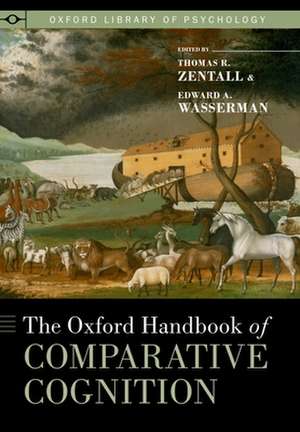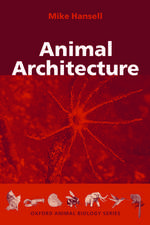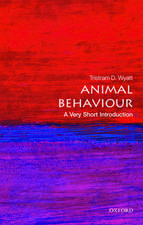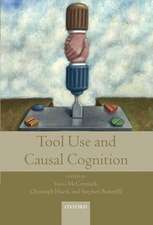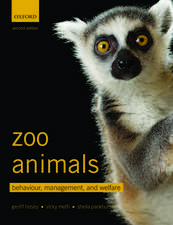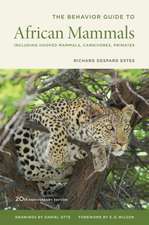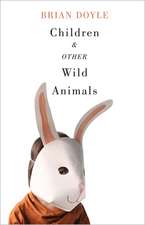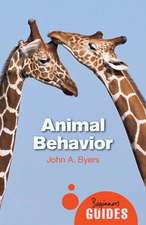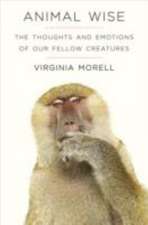The Oxford Handbook of Comparative Cognition: Oxford Library of Psychology
Editat de Edward A. Wasserman, Thomas R. Zentallen Limba Engleză Hardback – 19 apr 2012
Din seria Oxford Library of Psychology
-
 Preț: 365.73 lei
Preț: 365.73 lei - 23%
 Preț: 930.94 lei
Preț: 930.94 lei - 34%
 Preț: 794.94 lei
Preț: 794.94 lei - 32%
 Preț: 778.53 lei
Preț: 778.53 lei - 14%
 Preț: 1008.17 lei
Preț: 1008.17 lei - 34%
 Preț: 1080.01 lei
Preț: 1080.01 lei - 23%
 Preț: 926.67 lei
Preț: 926.67 lei - 34%
 Preț: 1055.19 lei
Preț: 1055.19 lei - 14%
 Preț: 339.74 lei
Preț: 339.74 lei - 23%
 Preț: 1081.51 lei
Preț: 1081.51 lei - 33%
 Preț: 687.81 lei
Preț: 687.81 lei - 23%
 Preț: 1218.63 lei
Preț: 1218.63 lei - 12%
 Preț: 659.49 lei
Preț: 659.49 lei - 33%
 Preț: 728.14 lei
Preț: 728.14 lei - 14%
 Preț: 605.02 lei
Preț: 605.02 lei - 34%
 Preț: 1296.28 lei
Preț: 1296.28 lei - 23%
 Preț: 1057.75 lei
Preț: 1057.75 lei - 33%
 Preț: 686.58 lei
Preț: 686.58 lei - 23%
 Preț: 982.70 lei
Preț: 982.70 lei - 33%
 Preț: 829.25 lei
Preț: 829.25 lei - 27%
 Preț: 1112.16 lei
Preț: 1112.16 lei - 24%
 Preț: 366.79 lei
Preț: 366.79 lei - 27%
 Preț: 1218.13 lei
Preț: 1218.13 lei - 34%
 Preț: 1154.63 lei
Preț: 1154.63 lei - 33%
 Preț: 684.05 lei
Preț: 684.05 lei - 33%
 Preț: 731.24 lei
Preț: 731.24 lei - 33%
 Preț: 650.02 lei
Preț: 650.02 lei - 34%
 Preț: 796.97 lei
Preț: 796.97 lei - 33%
 Preț: 682.10 lei
Preț: 682.10 lei - 33%
 Preț: 827.89 lei
Preț: 827.89 lei - 26%
 Preț: 708.76 lei
Preț: 708.76 lei - 23%
 Preț: 1628.61 lei
Preț: 1628.61 lei - 20%
 Preț: 618.15 lei
Preț: 618.15 lei - 5%
 Preț: 1228.30 lei
Preț: 1228.30 lei - 15%
 Preț: 370.97 lei
Preț: 370.97 lei - 5%
 Preț: 1426.29 lei
Preț: 1426.29 lei - 23%
 Preț: 1389.15 lei
Preț: 1389.15 lei - 5%
 Preț: 1041.50 lei
Preț: 1041.50 lei - 27%
 Preț: 1112.44 lei
Preț: 1112.44 lei - 23%
 Preț: 374.66 lei
Preț: 374.66 lei - 23%
 Preț: 937.60 lei
Preț: 937.60 lei - 33%
 Preț: 1094.59 lei
Preț: 1094.59 lei - 23%
 Preț: 1101.73 lei
Preț: 1101.73 lei - 33%
 Preț: 799.90 lei
Preț: 799.90 lei - 34%
 Preț: 1033.24 lei
Preț: 1033.24 lei - 34%
 Preț: 1358.82 lei
Preț: 1358.82 lei - 33%
 Preț: 804.39 lei
Preț: 804.39 lei
Preț: 1162.38 lei
Preț vechi: 1747.14 lei
-33% Nou
Puncte Express: 1744
Preț estimativ în valută:
222.42€ • 232.70$ • 184.77£
222.42€ • 232.70$ • 184.77£
Carte tipărită la comandă
Livrare economică 24-29 martie
Preluare comenzi: 021 569.72.76
Specificații
ISBN-13: 9780195392661
ISBN-10: 0195392663
Pagini: 960
Dimensiuni: 183 x 257 x 53 mm
Greutate: 1.81 kg
Ediția:Revised
Editura: Oxford University Press
Colecția OUP USA
Seria Oxford Library of Psychology
Locul publicării:New York, United States
ISBN-10: 0195392663
Pagini: 960
Dimensiuni: 183 x 257 x 53 mm
Greutate: 1.81 kg
Ediția:Revised
Editura: Oxford University Press
Colecția OUP USA
Seria Oxford Library of Psychology
Locul publicării:New York, United States
Recenzii
Those who study comparative cognition find themselves in a particularly prosperous time . . . A diversity of available species to study, opportunities for increased national and international collaboration, and technological advances offer us a greater opportunity for data collection and dissemination than at any time in history. The present book attests to how these opportunities can produce compelling research programs that serve as excellent models for the future of comparative cognition.
This book is an outstanding collection of chapters by an exceptional group of researchers. A unique aspect of this collection is the strong reliance on experimental science in each of the research programs. One chapter after another provides a critical analysis of the state of knowledge about a fascinating cognitive ability. How do animals perceive, order, and categorize the world? Do animals remember their own past? Do species differ in their sense of time and space? How flexible are animals in the use of tools and in their problem solving? Are there unique social cognitive processes? Each of these well-written chapters contains enough detail to provide the reader with the information necessary to reach their own conclusions about the validity of an argument. Everyone interested in the cognitive and intellectual capacities of animals should read this book.
This book is a gem. It brings together a large, readable, and rich set of chapters by an international group of experts on many of the most important topics in the study of cognitive processes in animals. It will be a 'must read' for students and scientists who are curious about the state of the art of the modern science of comparative cognition.
This impressive compendium shows the remarkable breadth and depth of current experimental research in comparative cognition. It is sure to become a major landmark in long history of this continually evolving field.
Comparative Cognition will be an invaluable resource for all working or being interested in the wide field of comparative psychology and neuroscience.
Excellent book...Highly recommended.
This book is an outstanding collection of chapters by an exceptional group of researchers. A unique aspect of this collection is the strong reliance on experimental science in each of the research programs. One chapter after another provides a critical analysis of the state of knowledge about a fascinating cognitive ability. How do animals perceive, order, and categorize the world? Do animals remember their own past? Do species differ in their sense of time and space? How flexible are animals in the use of tools and in their problem solving? Are there unique social cognitive processes? Each of these well-written chapters contains enough detail to provide the reader with the information necessary to reach their own conclusions about the validity of an argument. Everyone interested in the cognitive and intellectual capacities of animals should read this book.
This book is a gem. It brings together a large, readable, and rich set of chapters by an international group of experts on many of the most important topics in the study of cognitive processes in animals. It will be a 'must read' for students and scientists who are curious about the state of the art of the modern science of comparative cognition.
This impressive compendium shows the remarkable breadth and depth of current experimental research in comparative cognition. It is sure to become a major landmark in long history of this continually evolving field.
Comparative Cognition will be an invaluable resource for all working or being interested in the wide field of comparative psychology and neuroscience.
Excellent book...Highly recommended.
Notă biografică
Edward A. Wasserman, Ph.D., is Stuit Professor of Experimental Psychology, Department of Psychology, Iowa Center for Developmental and Learning Sciences, The University of Iowa. Thomas Zentall, Ph.D., is DiSilvestro Professor of Arts and Sciences and Professor of Psychology, University of Kentucky.
